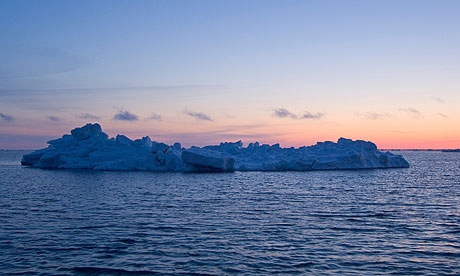Pollution not to blame for rapid ocean cooling, says Phil Jones paper
Research from UEA finds drop in temperature is too quick to be caused by the build-up of sulphur aerosols from fossil fuels
- by Shanta Barley, guardian.co.uk,

The discovery does not cast doubt on the overall science of human-caused climate change. But the study will receive more scrutiny than normal because it is the first scientific paper co-authored by Prof Phil Jones since he was cleared of accusations of manipulating data in the row over the hacked climate science emails which were written by University of East Anglia staff.
Between 1968 and 1972, in the time it took Nixon to serve one term as president of the United States, the surface temperature of oceans in the northern hemisphere plummeted by 0.3 °C. That might not sound large, but because water is so effective at storing heat it represents a huge amount of released energy.
Researchers had thought that the drop was due to the build-up of sulphur aerosols in the atmosphere from fossil fuel burning. These cool the planet by reflecting sunlight. But Jones and his colleagues conclude that it happened too quickly for that explanation to work.
"The work in the paper questions this somewhat," said Jones. "We didn't know that ocean temperatures in the northern North Atlantic cooled so rapidly before this paper." Previously, it was thought that sea surfaces in the northern hemisphere cooled gradually and steadily after the second world war before heating up abruptly in the 1970s.
Lead author David Thompson of the Department of Atmospheric Science at Colorado State University in Fort Collins, Colorado, agrees. "The pollution presumably ramped up over a longer time-frame."
Part of the reason for the confusion is because previous studies examined temperature change on a decadal scale. In contrast, Thompson's research uses data collected by ships and buoys over the past two and a half centuries to examine temperature change on a month-by-month basis.
The team fed the data into a model developed by Thompson that blocks out short-term changes in ocean temperature – triggered, for example, by volcanic eruptions which spew sulphur aerosols into the atmosphere. This allowed them to identify changes in ocean temperature that weren't linked to natural variation.
The model revealed that the cooling event was far from gradual, as previously believed: the temperature of the surface of oceans in the northern hemisphere dropped by 0.3 °C in just four years. The model also revealed that the focus of the cooling event was in the northern North Atlantic – from around the latitude of the southern tip of the UK northwards.
The cause of the cooling is not clear, but according to Mark Maslin of the Environment Institute at University College London, one possible culprit is the Great Salinity Anomaly – an unusually large discharge of ice from the Arctic Ocean in 1967 that caused a 10,000 cubic kilometre pool of fresh water to form off the coast of Greenland.
Normally, surface water in the northern North Atlantic cools during the winter, sinking as it becomes denser. In turn, warm, deep water rises to the surface, releasing its heat into the atmosphere. It is possible that the Great Salinity Anomaly shut down this mixing process and triggered a cool period by dumping light, fresh water on the surface.
It wouldn't have been the first time, said Mike Mann at Penn State University.
Around 12,800 years ago, a similar event on a far greater scale may have triggered a mini ice age. "A sudden runoff of fresh water into the North Atlantic from melting ice … suppressed the sinking of high-latitude North Atlantic ocean water that drives the thermohaline circulation."
Although the study has highlighted holes in our knowledge of past temperature trends, it hasn't changed the fact that greenhouse gases are warming the world up, said Gabi Hegerl at the University of Edinburgh. "In my opinion, this research does not question our current interpretation of the overall causes of 20th century warming."
Link: http://www.guardian.co.uk/environment/2010/sep/22/climate-science-ocean-temperatures-phil-jones







No comments:
Post a Comment